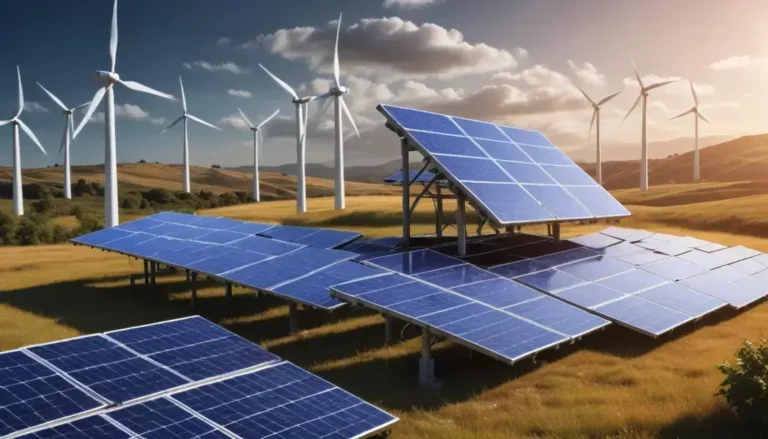BT Group’s Climate Transition Plan: A Game Changer
BT Group is committed to achieving net-zero emissions by 2040 through innovations in renewable energy, reducing Scope 3 emissions, and fostering industry collaborations to set sustainable standards in the telecommunications sector.
BT Group’s new Climate Transition Plan emphasizes sustainability as a core value, aiming for net zero emissions by 2040. How will they achieve this ambitious goal?
Overview of BT Group’s Climate Transition Plan
The Overview of BT Group’s Climate Transition Plan highlights the company’s bold commitment to achieving net-zero emissions by 2040. This comprehensive strategy encompasses various initiatives focusing on reducing carbon footprints while enhancing operational efficiency. By prioritizing technological advancements and sustainable practices, BT Group aims to lead the telecommunications sector in climate action.
One significant aspect of the plan is the emphasis on renewable energy sources. BT Group is investing heavily in solar and wind projects to power its operations sustainably. This shift not only decreases reliance on fossil fuels but also aligns with the global push towards cleaner energy alternatives.
Furthermore, BT Group is actively engaging in partnerships with environmental organizations and other businesses to amplify its impact. These collaborations are crucial for sharing best practices, driving innovation, and fostering community-based sustainability initiatives. By working collectively, BT Group intends to inspire others within the industry to adopt similar environmentally-friendly measures.
Another critical component involves engaging employees and stakeholders in their sustainability goals. By fostering a culture of accountability and environmental responsibility, BT Group encourages practices that contribute to its climate objectives while enhancing overall employee engagement and commitment to climate stewardship.
Commitment to Net Zero by 2040
BT Group’s Commitment to Net Zero by 2040 is a pivotal aspect of its sustainability strategy. This ambitious initiative demonstrates the company’s dedication to reducing greenhouse gas emissions across its operations. By setting this target, BT aims to lead the telecommunications industry toward a more sustainable future.
One of the key elements of this commitment involves enhancing energy efficiency in all facilities. BT Group is implementing state-of-the-art technologies to minimize energy consumption, thus reducing its overall carbon footprint. Such measures include upgrading existing infrastructure to utilize energy-efficient systems.
Moreover, BT is focusing on innovating renewable energy use. The company plans to source at least 75% of its energy from renewable sources by 2025, significantly contributing to reaching its net-zero goal. Partnerships with renewable energy providers are crucial to this strategy, allowing BT to leverage cleaner energy solutions.
Engagement with stakeholders is another essential component of this commitment. BT Group is actively collaborating with employees, customers, and communities to promote sustainability awareness. This approach not only encourages eco-friendly practices but also fosters a collaborative environment for achieving common goals in combating climate change.
Reduction of Scope 3 Emissions
BT Group’s Reduction of Scope 3 Emissions is a critical focus area within its climate strategy. Scope 3 emissions are indirect and often the largest part of a company’s carbon footprint, arising from its value chain, including suppliers and customer use of products. Addressing these emissions is essential for achieving meaningful environmental impact.
To effectively tackle Scope 3 emissions, BT Group is implementing comprehensive strategies that involve engaging with suppliers to enhance sustainability practices. The company promotes responsible sourcing of materials, encouraging suppliers to adopt environmentally-friendly practices that align with BT’s climate goals.
Additionally, BT Group is enhancing customer engagement by promoting sustainable product usage. This includes initiatives to educate customers on reducing their emissions through energy-efficient solutions and responsible disposal methods. By collaborating closely with users, BT aims to foster an eco-conscious customer base.
Tracking progress is also vital in this effort. BT Group is committing to transparent reporting on emissions reductions and is using advanced data analytics to measure the effectiveness of its initiatives. These actions not only contribute to the company’s net-zero target but also set a benchmark for others in the industry to follow suit.
Innovations in Renewable Energy
BT Group’s focus on Innovations in Renewable Energy marks a significant step towards achieving sustainable operations. By investing in cutting-edge renewable technologies, the company is not only working to reduce its carbon footprint but also help set new industry standards. Emphasizing solar and wind energy, BT is committed to diversifying its energy portfolio to align with climate goals.
One particular area of innovation is the development of advanced solar panels that maximize energy capture while minimizing land use. These panels are designed to be more efficient, allowing BT to generate renewable energy with a smaller environmental impact. Furthermore, the integration of energy storage solutions helps in managing supply during peak demand times, ensuring a stable energy flow.
BT Group is also exploring partnerships with technology providers to harness the power of smart grids. This technology optimizes energy distribution and improves overall efficiency by integrating renewable energy sources seamlessly with existing infrastructure.
Research and development play a crucial role in BT’s renewable strategy. The company is actively supporting projects that explore innovative energy solutions, such as hydrogen fuel and offshore wind farms. By leading these initiatives, BT Group aims to not only achieve its energy goals but also inspire similar efforts in the telecommunications industry and beyond.
Industry Impact and Future Collaborations
BT Group’s focus on Industry Impact and Future Collaborations emblemizes its commitment to fostering a sustainable telecommunications sector. By taking the lead in climate initiatives, BT significantly influences industry standards and practices, encouraging competitors to adopt similar methodologies. This leadership is vital for accelerating the transition to a low-carbon economy.
Collaborations with other companies, government bodies, and NGOs amplify BT Group’s impact. These partnerships are strategically designed to drive innovation in sustainability practices. Joint ventures focusing on developing renewable energy technologies exemplify BT’s effort to create shared value for the industry.
Moreover, BT is actively participating in industry coalitions aimed at promoting best practices in emissions reduction. These collaborations not only enrich BT’s approach but also provide an essential platform for knowledge sharing. Working together, industry players can innovate faster and more effectively tackle shared challenges related to climate change.
Looking towards the future, BT Group envisions deeper collaborations with stakeholders to create transparent supply chains and promote sustainable procurement processes. By establishing sustainability as a collective goal, BT Group not only enhances its business models but also motivates other companies to follow suit, creating a ripple effect across various sectors.
In conclusion, BT Group’s commitment to sustainability
BT Group is making significant strides in promoting sustainability within the telecommunications industry. By focusing on innovations in renewable energy, reducing emissions, and collaborating with partners, the company demonstrates how corporate responsibility can lead to a positive environmental impact.
Its goal of achieving net-zero emissions by 2040 sets a benchmark for others to follow. The proactive strategies that BT Group implements reflect a deep understanding of the urgent need for climate action and industry leadership.
As BT Group continues to drive change through thoughtful initiatives, it encourages other businesses to join in on the journey toward a more sustainable future. Embracing eco-friendly practices not only benefits the environment but also offers new opportunities for growth and innovation.
In this way, BT Group is not just a telecommunications company; it is a pivotal player in the global movement toward sustainability and environmental stewardship.
Frequently Asked Questions
What is BT Group’s commitment to sustainability?
BT Group is committed to achieving net-zero emissions by 2040 and actively promotes renewable energy solutions within the telecommunications industry.
How does BT Group plan to reduce Scope 3 emissions?
BT Group focuses on engaging suppliers and customers to implement sustainable practices and improve overall emissions management throughout its value chain.
What innovations in renewable energy is BT Group exploring?
BT Group is investing in advanced solar and wind technologies, as well as smart energy solutions that enhance energy efficiency and reduce environmental impact.
How does collaboration play a role in BT Group’s sustainability efforts?
BT Group collaborates with various partners, including companies and NGOs, to drive innovation and establish best practices in sustainability across the industry.
Why is reducing emissions significant for BT Group?
Reducing emissions is vital for BT Group to meet its climate goals, set industry standards, and contribute positively to global climate initiatives.
What can other companies learn from BT Group’s approach to sustainability?
Other companies can learn the importance of setting ambitious goals, engaging stakeholders, and fostering partnerships to enhance their sustainability efforts.






